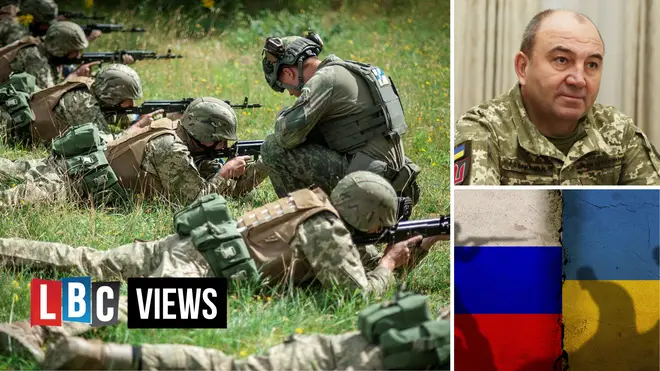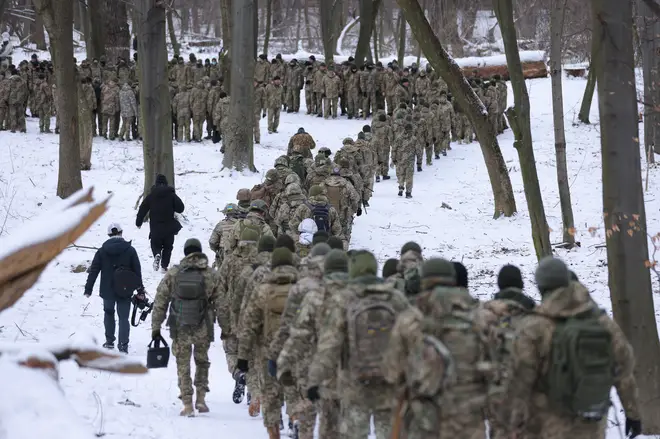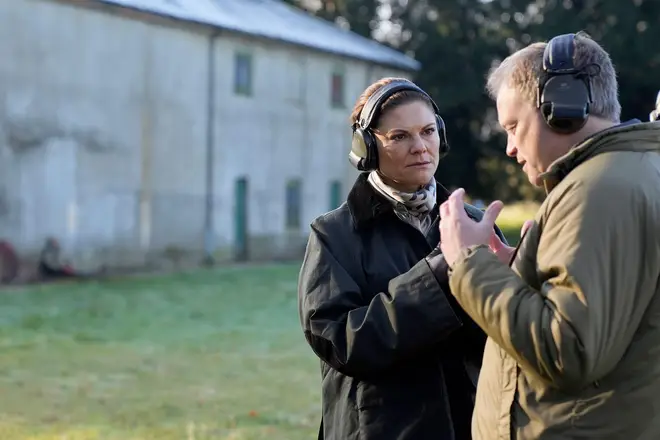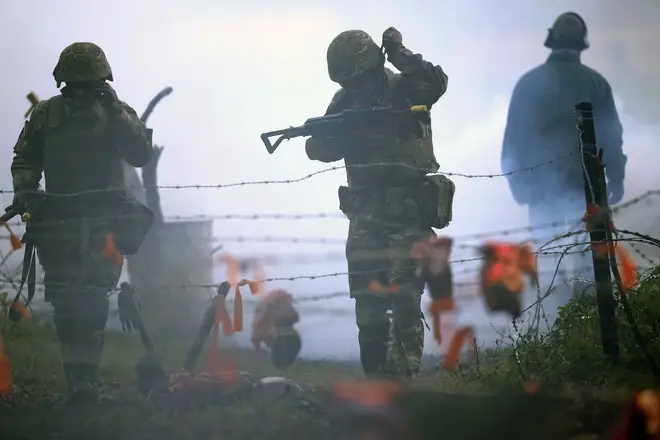
Iain Dale 7pm - 10pm
23 February 2024, 06:30 | Updated: 23 February 2024, 07:39

As the second anniversary of Russia's illegal invasion of Ukraine, it is hard not to reflect on just how much an impact it has had on us all.
Seven hundred and thirty days ago Russia invaded Ukraine, and soldiers from one nation crossed the border into another and were ready to fight, which was unthinkable for many who have only known peace during their lifetime, especially for it to happen in Europe.
Things felt different two years ago, but then on the 24th of February 2022 the world changed, and not for the better.
Russia's invasion, the largest military action in Europe since World War II, has led to devastating consequences for Ukraine and its people and significant geopolitical ramifications.
An unknowable tally of lives lost a somber reminder of the human cost of conflict. They're not soldiers, they're not a number, they're people, sons and daughters, lovers, friends.
Aside from the lives lost fighting the war, hundreds of thousands have been uprooted from the familiarity of home, men, women, children, and unborn babies made refugees, unable to live in their own country, ending up being sent to seek solace in distant lands, their futures are as uncertain as the shifting front lines of the war.
Read more: Russia to be 'starved' of weapons as UK announces further sanctions
Across the globe, nations have united in coalition, bracing against the chilling gusts of Russian aggression. Doing whatever they can to help those in need.
In the UK under the guise of OP INTERFLEX, our armed forces have come together with Canada, New Zealand, Norway, Denmark, Finland, Sweden, Lithuania, The Netherlands, and Australia to help train tens of thousands of ordinary Ukrainians, turning bakers into soldiers, teaching military skills to people who never wanted to learn them.
It's a moment that tests the resolve of the international community, challenging leaders to navigate the treacherous waters of diplomacy and defence.
But amid this crisis, the spirit of humanity burns brightly, a beacon of hope brightening the shadows of despair. As we bear witness to history's relentless march, we are reminded that the price of freedom is eternal vigilance, the cost of peace, an unwavering commitment to justice and unity.
The lifelong British soldier teasing a Ukrainian teacher about swapping 'chalk for claymores', a driving instructor from Kyiv explaining they 'know about the cold' until they're spending their third night in a row on Salisbury Plain in the winter.
This is the UK response. The British military cannot fight the Russians directly, but they can sure as hell train the Ukrainians.

Speaking to LBC Digital, Deputy Minister of Defense of Ukraine, Ivan Havryliuk, explained the significant role of international support, particularly from the United States and the UK, in strengthening Ukraine’s defence against ongoing Russian aggression.
Despite substantial aid, the Lieutenant General pointed out the daunting challenges his country faces due to Russia’s significant advantages in terms of economic, human resources, and defence industry capabilities. “Russia’s military expenditures are reaching new heights, making continued support from the US not just beneficial but critically essential for us,” he told LBC.

Ben Kentish hears from former army general on war with Russia
Lt Gen Havryliuk outlined the urgent need for advanced weaponry and technology, including F-16 aircraft, long-range artillery ammunition, ATACMS missiles, and modern electronic warfare systems to change the dynamics at the front significantly. “The current disparity in artillery firepower and air dominance heavily favours Russia, complicating our defence efforts,” he told LBC.
The General also told LBC Digital of the strategic importance of bolstering Ukraine’s firepower to improve battlefield opportunities, stressing the critical state of ammunition stocks which are nearing dangerously low levels. “The long-awaited F-16s could crucially shift the aerial balance in our favour, a key aspect of enhancing our defensive and offensive operations on the ground,” he added.
The escalating conflict between Ukraine and Russia, characterized by Putin's intensified offensive actions despite significant losses, highlights a stark war of attrition.

US former diplomat James Rubin speaks to Nick Ferrari on the second anniversary of the Ukraine war
This comes as Britain announces a new package of military aid to Ukraine, further solidifying the international response to the conflict.
Yesterday, Defence Secretary Grant Shapps said that the UK would send 200 more anti-tank missiles to Ukraine, aiming to boost its defenses. “The UK won't stop supporting the brave Ukrainians until they have won,” Shapps said as the world marks the second anniversary of Russia's full-scale attack.

The UK's contribution of Brimstone anti-tank missiles, noted for their significant battlefield impact, and the commitment to train an additional 10,000 Ukrainian troops in the first half of 2024 under Op Interflex, reflect a broader international effort to enhance Ukraine's military resilience.
Shapps’s announcement in the Commons about the new aid package and the training initiative sets out the UK's strategic approach to supporting Ukraine.
But Mr Shapps also advised the United States that it will find it "far more expensive" in the future to defend the world order if it does not maintain its support for Ukraine.

The call for increased military support from the West and all civilised nations was echoed by Conservative former defence minister Mark Francois, emphasising the cost-effective nature of support over the potential human costs of inaction.
While Labour's Shadow Defence Secretary John Healey reaffirmed the UK's unwavering commitment to supporting Ukraine, stressing the need for ramped-up military support, a clear path for Ukraine’s NATO membership, and renewed diplomatic efforts to maintain Western unity and hold Russian President Vladimir Putin accountable.
As international support continues to play a pivotal role in Ukraine’s defence strategy, the contributions from the UK and the ongoing support from the US highlight the global commitment to defending democratic integrity and territorial sovereignty.
The situation remains dynamic, with Ukraine’s allies reinforcing their support as the conflict enters a critical phase.